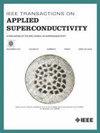Thermal Energy Consumption of a SMES Cooled by Liquid Hydrogen in a Fuel Cell-Battery System
IF 1.7
3区 物理与天体物理
Q3 ENGINEERING, ELECTRICAL & ELECTRONIC
引用次数: 0
Abstract
The use of liquid hydrogen (燃料电池-电池系统中液氢冷却中小企业的热能消耗
在燃料电池驱动的船舶上使用液态氢($\text{LH}_{2}$)已经被研究。然而,直接将$\text{LH}_{2}$加热到燃料电池的工作温度需要相当大的能耗。超导磁储能系统在运行过程中,由于交流损耗产生的热量必须及时被制冷系统排除。$\text{LH}_{2}$被认为是一种很有前途的超导制冷介质。因此,本文建立了一个$\text{LH}_{2}$ -燃料电池-SMES电热集成系统,其中$\text{LH}_{2}$用于SMES制冷,并作为燃料电池的燃料供应。通过计算三种不同能源管理策略下的中小企业交流损耗和燃料电池氢消耗,确定了系统的制冷和燃料供应需求。$\text{LH}_{2}$的初步加热是通过SMES制冷来实现的,随后由燃料电池进行膨胀功和产生的热量来满足燃料电池所要求的运行条件。结果表明,在等效消耗最小化策略(ECMS)下,燃料电池的氢消耗最低,但系统总能耗最高。交流损耗优化策略A最大限度地减少了中小企业的交流损耗,减少了制冷系统的负荷,但增加了氢的消耗。策略B最优地平衡了中小企业交流损失和燃料电池氢消耗,导致燃料电池氢消耗与ECMS下几乎相同,显著低于策略A,整体系统能耗低于ECMS下。
本文章由计算机程序翻译,如有差异,请以英文原文为准。
求助全文
约1分钟内获得全文
求助全文
来源期刊

IEEE Transactions on Applied Superconductivity
工程技术-工程:电子与电气
CiteScore
3.50
自引率
33.30%
发文量
650
审稿时长
2.3 months
期刊介绍:
IEEE Transactions on Applied Superconductivity (TAS) contains articles on the applications of superconductivity and other relevant technology. Electronic applications include analog and digital circuits employing thin films and active devices such as Josephson junctions. Large scale applications include magnets for power applications such as motors and generators, for magnetic resonance, for accelerators, and cable applications such as power transmission.
 求助内容:
求助内容: 应助结果提醒方式:
应助结果提醒方式:


